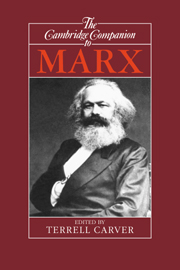8 - Reproduction and the materialist conception of history
A feminist critique
Published online by Cambridge University Press: 28 May 2006
Summary
In this chapter we shall be exploring one of Marx's most important concepts, that of reproduction. We shall look at the ways in which he did use it and also consider the reasons why he did not use it in some other ways. It may seem strange to spend so much time on what Marx (and Engels) did not do, but considering this omission and the reasons for it may throw light on some fundamental features of Marx's method. In particular, it should help us understand what underlies his materialist conception of history and assess the feminists' basic criticism: that its concentration on production rather than human reproduction means that it is not adequate to the task of explaining gender differences in society and understanding the history of struggle over them.
The plan of the chapter is as follows: First we shall examine Marx's use of the term reproduction to refer to the reproduction of whole social systems, in particular, their class structure. Then we shall consider whether accounts of how social systems reproduce themselves are complete if they do not include human reproduction, the way that people within such systems are born and raised to occupy particular class and gender positions. After this, we shall look at what Marx and Engels had to say about human reproduction and what significance they gave to the consideration of its social forms in their historical analysis. We shall find that their record on this matter is ambivalent - they seem to give human reproduction more importance in describing their historical method than in their actual analyses - and we shall explore why this should have happened. Finally, we shall look at some directions in which work that stays within the Marxist tradition but accords human reproduction more importance might go.
- Type
- Chapter
- Information
- The Cambridge Companion to Marx , pp. 196 - 221Publisher: Cambridge University PressPrint publication year: 1991
- 6
- Cited by



